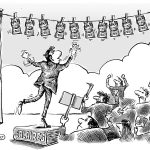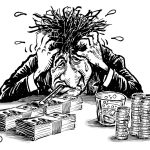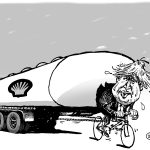Bond garbage
Are all bonds becoming “investment garbage” as Bill Gross claims?
I report here the cry of alarm, not to say of anger that has just launched Bill Gross, the famous and former boss of the PIMCO fund. For the “King of the bond”, interest rates can only rise, because this market, largely overvalued, is doomed to its loss, and investors to ruin. He added that stock markets are also likely to sink, when companies will no longer deliver the expected returns, despite the “ideal” conditions granted by Central Banks.
Specifically, Bill Gross forecasts that yields on the 10-year U.S will soon rise back to 2%. Treasury by the end of the year (nearly 70 basis points). Because the Federal Reserve will be well led to reduce its asset purchases, in response to the dynamics of activity and the acceleration of inflation. These predictions, worthy of a Cassandra, go against many analyses that consider that the recovery in activity will continue to carry stock prices, while the moderation of the Federal Reserve will support the markets.
In support of these claims, Mr. Gross highlights the increase in US public debt and even more the prospect of new budgetary plans carried by the Biden administration ($ 1,100 billion), as well as the demands of the left of the Democratic Party, which intends to link the infrastructure plan to a broader project of $ 3,500 billion. While the Central Bank should be more parsimonious, how will the markets be able to calmly absorb this additional influx of public debt? The fiscal year ending at the end of September should see the US government post a deficit of around $3.5 trillion.
The race for yields has certainly contributed to a deterioration in the quality of investors’ portfolios and increased the risk borne by savers.
There is cause for concern indeed. The dramatic rise in public – and private – debt following the support policies implemented in the face of the Covid-19 pandemic has been accompanied by a decline in bond yields due to the massive intervention of Central Banks. These have absorbed almost all the additional debts issued by the States. The key to this gigantic gamble: a rebound in activity such that it will naturally “erase” – through the influx of tax revenues – the surplus deficit granted. In addition, even if the purchase programs end in a few months, Central Banks will most likely keep the assets acquired on their balance sheets. Unless, like the Bank of Japan, they have no choice but to persevere.
In doing so, asset prices have all risen and undermined many investment strategies, increasing risk-taking. In the United States, for example, the average rate of so-called speculative corporate debt fell to 3.53% over the summer, 1 percentage point below the lowest level ever reached by this asset class. The race for yields has certainly contributed to a deterioration in the quality of investors’ portfolios and increased the risk borne by savers. Some are now turning to less and less liquid debt, offering very low volumes, for more attractive yields.
Too abrupt a move of investor mistrust, on the occasion of a poorly anticipated monetary tightening for example, could well trigger a chain reaction across portfolios, pushing investors to panic off good quality assets to cover their losses. This is certainly what Bill Gross fears – and rightly so. But if the rest of the world, still hungry for dollars – and made wary of China’s regulatory turmoil – continues to buy US debt, what other risk does this government run than that of an ever-growing external deficit?
Water accumulates dangerously behind the dam. Will it give in?
Valérie Plagnol – Sep2021 – Published in French in www.allnews.ch – Cartoon ©Barret



